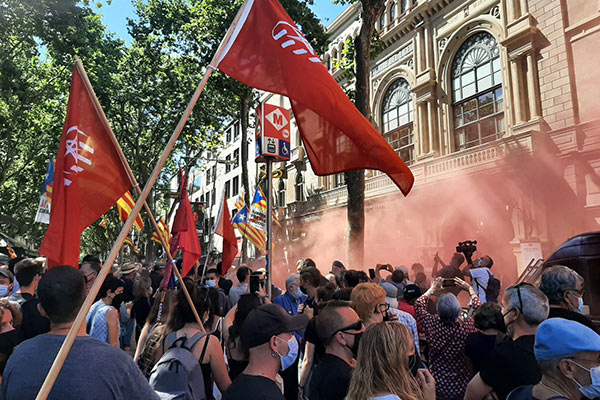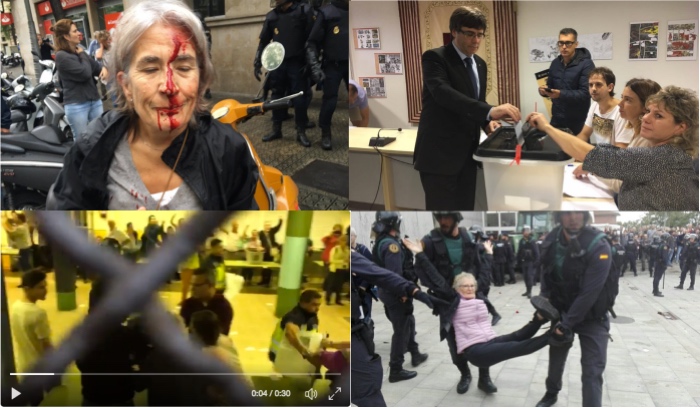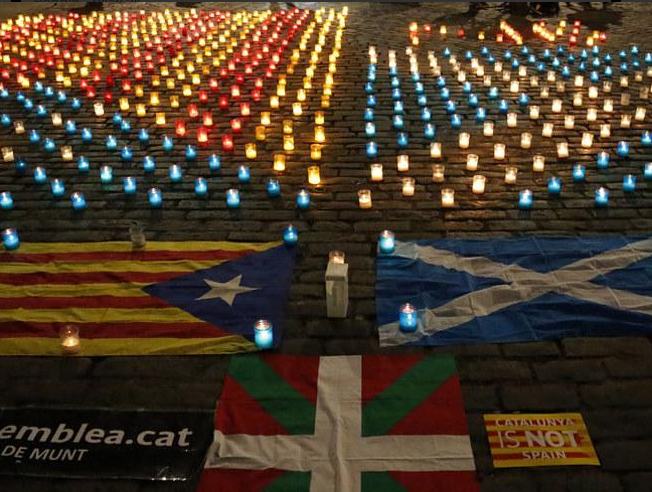What do the pardons mean for the Catalan independence movement?


Catalan independence supporters protested against Spanish prime minister Pedro Sanchez in Barcelona last week (Pic: Help Catalonia)
In June, Spanish prime minister Pedro Sánchez pardoned nine Catalan pro-independence political prisoners, who had been given jail sentences for a combined 100 years for their role in the 2017 indyref. Ben Wray speaks to leading Catalan indy activists about what motivated Sánchez’ move, and what it means for the independence movement.
Elisenda Paluzie does not usually get praised by Spanish Government ministers. And certainly not in the pages of El Pais.
In early June, ministers had been sharing a tweet among each other from the president of the Catalan National Assembly (ANC), one of the main pro-independence organisations in Catalunya, about the prospect of the Spanish Government pardoning the nine Catalan pro-independence leaders in prison for their role in the 2017 referendum.
“The pardons will not be a success,” Paluzie’s tweet read. “They will be an intelligent political decision by the government against the independence movement. Politically they are disarming us and internationally they will be disastrous.”
The ministers believed Paluzie was “seeing the play…clearly”, according to El Pais, i.e. the pardons were indeed a ploy to demobilise the Catalan independence movement.
A few weeks later, on 22 June, Pedro Sánchez went ahead with what could be his most significant act as Spanish Prime Minister to date, releasing the prisoners, who have already served three and a half years behind bars, and promising that it was the start of a “new era of dialogue and understanding”. That new era has begun with talks between Sánchez and the new Catalan President Pere Aragonès, who cautiously welcomed the pardons (which still bars the Nine from political office, and can be reversed if they are deemed to have breached the law again), while calling for amnesty for all those involved in the referendum and self-determination for Catalunya.
Reflecting on her pre-pardons’ analysis now, Paluzie tells Bella Caledonia that while clearly delighted the Nine are out of prison, she believes her fears about the political effect of the pardons have so far largely been proven correct.
“Internationally, the Spanish Government is communicating the idea that it is generous and is trying to solve the conflict,” she says. “Somehow, that message has worked, as the UN General Secretary, António Guterres, has congratulated them on their move.”
On the day before the pardons, the human rights organisation Council of Europe released a report calling on the Spanish Government to release the political prisoners, drop attempts to extradite those Catalan leaders who are still in exile and change its laws on sedition and rebellion which formed the legal basis of the jail sentences. The CoE report directly compares the Catalan situation to the Turkish one, an obvious embarrassment for the Spanish Government and the EU. Paluzie believes not only was Sánchez well aware this report was coming, but that more international pressure was in the pipeline too.
“There is also the judgement, which will come maybe in a year, from the European Court of Human Rights in Strasbourg, which can be very negative for the Spanish judiciary. So, from Sánchez’ perspective, probably it is best that the prisoners are already released before they are told to do it by an international tribunal,” she explains.
The other side of the pardons’ equation is Sánchez’ domestic political interests. A superficial analysis would tell you that the pardons are politically bad for the Spanish Government, with a poll showing the majority of Spaniards are opposed to the move, while the Spanish right-wing are furious, mobilising its base in big numbers to protest in Madrid against the decision. This has led some analysts to describe Sánchez’ move as “very brave”.
However, Sánchez can live with the wrath of a right-wing he doesn’t rely on to govern. What he can’t live with is Esquerra Republicana (ERC), the largest pro-independence centre-left party in Catalunya which leads the newly formed Catalan coalition government, spearheading an insurgent independence movement. Sánchez’ coalition government is a minority, relying on the votes of ERC and Basque nationalist parties, PNV and EH Bildu, to pass laws and budgets.
“The pardons is a way to try to give an impression in Catalunya of a willingness to negotiate, and so the push for independence slows down,” Paluzie tells Bella.
“Dialogue” to nowhere?
Both ERC and Sánchez’ have talked up the need for “dialogue” to resolve the Catalan conflict, but eventually dialogue has to lead to results, and it’s difficult to see how a demand for Catalan self-determination can be reconciled with Sánchez’ implacable opposition. The prime minister repeated again after the talks had begun with Aragonès that: “There will be no referendum on self-determination. Never, ever”.
Given this, what can ERC possibly hope to achieve from the talks? In a controversial column shortly before the pardons were announced, Oriol Junqueras, the ERC’s President who was given the longest prison sentence (13 years) by the Supreme Court for his role as Catalan vice-president during the 2017 referendum, ruled out pursuing any other route than an agreed referendum with the Spanish state. Paluzie believes that the party has weakened its own negotiating hand by taking the unilateral route to a referendum off the table.
“If you are renouncing unilateralism, then what is the incentive of the Spanish state to allow an agreed referendum on independence?” She asks.
Ignasi Bernat, co-editor of ‘Building a New Catalonia: Self-Determination and Emancipation‘, tells Bella that ERC are well aware that they are not going to get a referendum out of Sánchez so easily, but have their own play in mind.
“I think ERC is trying to reach a position of centrality in Catalan politics, of hegemony, and to do this they want to de-escalate the conflict a little bit, not because they are traitors or something like that, I don’t have that feeling, but maybe because their strategy – as Junqueras has said several times – is more about independence in ten or 15 years time,” Bernat says.
“They want to be the hegemonic party for the next 10-15 years, and they think with this approach they can win votes from all sides” he adds. “But I think their position is not so strong. In the February Catalan elections they were the first political party, but the difference with Junts per Catalunya was not so big to allow for such a risky move.”
Convinced that the dialogue is unlikely to go anywhere for the pro-independence side, Paluzie believes that ERC may be be walking into “a trap”: Sánchez may make “an offer which says ‘okay we are going to give you more competence, more powers’, and then if the Catalan Government refuse, the Spanish Government will say they are the ones who are inflexible.”
She adds: “If the Spanish Government manage to reduce the level of support for independence by 10 or 20%, that will be an intelligent move for them. It’s also about reducing the tension; if there is political tension the support for independence is also stronger.
“This is what we call the stability pact. It’s appeasement; not really solving the issues that are at stake, but trying to cover it with a type of reform which will at least reduce a significantly high amount of support for independence, and postpone the problem for a generation.”


A state apparatus beyond Sánchez’ control
Perhaps the most important road-block to Sánchez’ “appeasement” strategy is the Spanish state he leads, which has not uniformly accepted his “new era of dialogue and understanding” mantra. Shortly after the pardons were announced, the Court of Auditors, which is dominated by the right-wing Popular Party (PP), announced new fines totaling €5.4m on 34 Catalans involved in the 2017 referendum.
The fines are justified on the basis that foreign trips by the Catalan Government which involved the mere mention of the words Catalan independence – not illegal now nor at the time – were a “misuse of public funds”, and thus have to be paid back personally by the guilty parties. The ruling may see the homes of former government employees seized by the state if they cannot make payment. The case has received international attention because a Harvard Emeritus Economics professor, Andreu Mas-Colell, who was an economy minister in the Catalan Government from 2010 to 2016, has been charged €2.8m, leading 33 Noble prize laureates and thousands of others to come out in his defence.
Meanwhile, the same Court of Auditors only two years ago overturned the conviction of Ana Botella, a former PP mayor of Madrid, who had been ordered to pay back €22.7 million to the public purse after selling Madrid council flats to a vulture fund in 2013 well-under their true value and without a competitive bidding process, in a clear corruption case. The acquittal, by two votes to one, was delivered by two councillors hand-picked by the PP, one of whom was a former minister in the PP Government led by José María Aznar. Botella is Aznar’s wife. Echoes of Francoism still reverberate in the more shady corners of the Spanish state.
If the Court of Auditors was the only judicial attack, that may be manageable, but it’s likely to be just the start of a repression involving over 3000 people who are being investigated, in prison or awaiting trial for their role in the 2017 referendum or the 2019 protest movement against the jail sentences of the Nine. There’s no pardon for all of them, and when it comes to the Spanish judiciary the PP appears to be just as influential as the government in determining their actions.
“It’s going to be very difficult to pursue Sanchez’ appeasement strategy when you have the judiciary out-of-control,” Paluzie concludes.
Bernat, who has argued that the Spanish state is “post-fascist”, agrees that Sánchez is not fully behind the steering wheel.
“The state apparatus’ ongoing repression is undermining the position of the Spanish Government – the judiciary and deep state are not going in parallel with Sánchez, they follow their own position,” he says.
“The central idea of the post-fascist state continues to be clearly there. I don’t see that the deep state and the state apparatus has changed at all. The Court of Auditors is also proof of that. Two years after ‘the most progressive government in history’, none of the central elements for the democratisation of the state have been implemented.”


A “Scottish way” to Catalan independence?
In October, it will be four years since that unforgettable day when images were beamed around the world of Barcelona pensioners fighting their way past Spanish police batons to vote in the Catalan independence referendum. The fallout of the 1 October referendum continues to dominate Catalan politics, and the emotions of that day are still raw for those who participated, but some of the leading protagonists are beginning to piece together what they believe to be the lessons of ‘1-O’, and drawing conclusions from that for the future.
Junqueras, in his hotly debated column of early June, also raised self-criticisms of the 2017 referendum for the first time, stating that the Catalan Government’s approach “was not seen as fully legitimate by a large part of society, including Catalan society”, a problem that needed to be rectified in any future referendum.
“The conclusion is that we need to be more,” Junqueras adds, “an undisputed, plural and transversal majority”. And that route must be the “Scottish way”; “the path of pact and agreement, the path of the agreed referendum.”
Paluzie is highly critical of Junqueras’ reflection on 1-O.
“The unilateral referendum was a victory,” she argues. “The Spanish Government was telling us for months and weeks before that ‘it’s not going to take place’, ‘there are not going to be any ballot boxes’. They sent 8,000 police to prevent it from taking place and they couldn’t prevent it. We demonstrated through non-violence and popular mobilisation to defend the polling stations; this was something extraordinary.”
The ANC President believes the major mistake in 1-O was the prevaricating response of the Catalan political leaders in the days following the vote.
“The Catalan Government stopped everything, they asked for dialogue, they asked for a mediation, they gave time to the Spanish Government to re-organise themselves and activate the suspension of our autonomy, with the article 155.”
As for the “Scottish way”, Paluzie questions whether the Edinburgh Agreement which led to the agreed referendum of 2014 even remains the de facto route in Scotland, never mind Catalunya.
“Even Britain is now questioning the right of Scotland to have a second referendum,” she says. “So unfortunately independence is a battle that is hard to fight, and usually history tells us that it has to be done unilaterally; by facts, by forcing them to accept the democratic reality.”
Benat, who is a member of the radical left pro-independence party CUP, the third pro-independence force in the Catalan Parliament, agrees that the movement needs to reflect on 2017, but the lessons he is focused on are somewhat different.
“As CUP, we wanted the radical transformation of our economic and social system, and that meant having the capacity to create money, to control the territory, to nationalise sectors that are necessary for the functioning of a new state – all of these things were needed, but were not present,” he says.
The Catalan independence movement is a huge, diverse social force, one that has been restrained over the last year and a half by the pandemic and has suffered from four years of state repression, but is by no means a spent force.
“For a movement like ours, we need lots and lots of people in the streets – it’s a politics of bodies – in order to challenge the state apparatus,” Benat says. “We need some time to be able to do this politics of mobilisation again, but also if we can stop some of the most brutal repression, it is possible we can create a new collective strategy. I have the feeling that we are buying time.”

I can’t see planning “10-15 years of hegemony” as being good for democracy or the prospect of independence. In 15 years ERC will have become an effete and corrupt establishment. We don’t need to look too far for parallels.
ERC seems to be playing a long game indeed. Who knows what they’re up to. Little commented liaison w the Basque Bildu party (astute Arnoldo Otegi) also looking to reinforce peripheric power as a block that can be king maker in 2 party Spain where right and left are equally divided.
Anyone reading this interesting text wld be well advised to listen to Paluzie, I like her analysis, but even she has no answers. Being a bone in the jaws of the Spanish state gets very wearing. Hope Scots see off Johnson before he tries anything.
Thanks, Mr Wray, for this setting out of various aspects of the arguments around the pardons and the acceptance of them by those imprisoned.
There are many things in this to consider regarding our situation in Scotland and how we progress towards independence. While it would be best to reach a legal agreement and, hopefully, a reasonably respectful one, to enable the dissolution of the union, history tells us that we always need to keep open options, such as civil disobedience, strikes, etc, which have been used by other groups in other countries.
Can you imagine Nicola Sturgeon doing 12 years while the corrupt Tory govt go about their “business” and warmongers like Blair, Brown and Cameron wander free doing their after dinner money grabbing speeches.